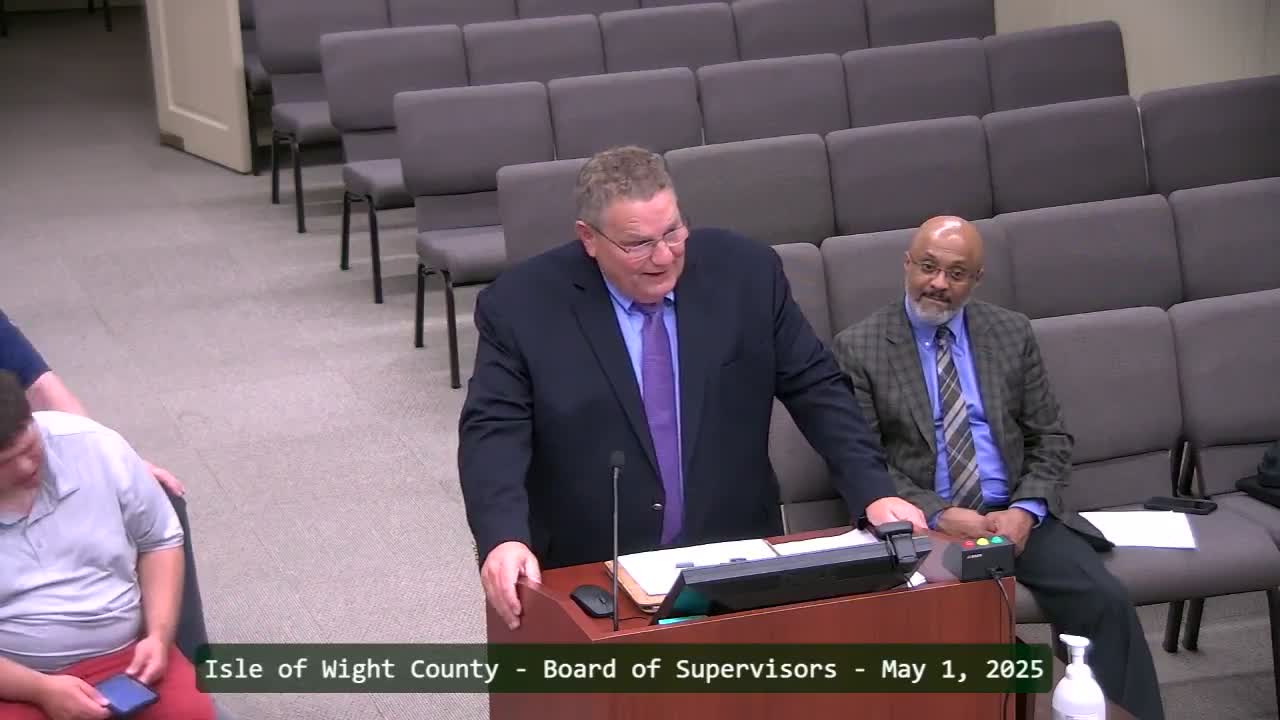SPSA asks member localities to extend agreements so private firm can build AI sorting plant; landfill expansion remains necessary
Get AI-powered insights, summaries, and transcripts
Subscribe
Summary
Dennis Bagley, executive director of the Southeastern Public Service Authority, urged Isle of Wight supervisors to approve an extension of user-support agreements so SPSA can finalize negotiations with a private contractor that would use AI and robotics to sort mixed waste and divert organics to biochar production.
Dennis Bagley, executive director of the Southeastern Public Service Authority, told the Isle of Wight County Board of Supervisors that SPSA is seeking amended user-support agreements from member localities to allow negotiations with a private contractor for a regional alternative waste disposal facility.
Bagley said the firm SPSA selected, Commonwealth Sortation, would sort mixed trash with artificial intelligence and robots, divert organics for conversion to biochar and remove recyclables so the regional landfill could last longer. "If you cut our waste stream in half, then that then makes the landfill last through the end of the century," Bagley said, describing the company’s 50% diversion guarantee.
The ask to member localities is limited: sign an amendment to extend the term of existing user-support agreements so SPSA can negotiate and, if the parties agree, enter a long-term contract. Bagley emphasized the user-support agreement extension does not obligate a locality to use an alternative disposal method: "This request does not mean that you're signing up for alternative waste disposal or you're signing up for landfill," he said.
Why it matters: SPSA projects the regional landfill’s presently permitted capacity (about 9,800,000 cubic yards) will be exhausted by about 2034 at current inflows; adding two additional permitted cells (8 and 9) would add roughly 16,000,000 cubic yards and extend capacity to about 2060. Bagley said combining the planned cells with an alternative processing facility could push usable disposal capacity to the end of the century if diversion targets are met.
Key facts reported by SPSA staff and Bagley: - Average inbound volume including cover: about 506,000 tons per year. - Cells 1–4 are closed; Cells 5–6 are filling; Cell 7 is permitted and under construction; cells 8–9 are pending wetlands permits and awaiting a Record of Decision on a recently completed Environmental Impact Statement posted to the Federal Register. - SPSA purchased wetland mitigation credits earlier (at roughly $48,000 per credit then), and Bagley said remaining credits are scarce and costly today. - Proposed private contract would require a roughly 20-year commitment and represents a capital investment estimated at over $100 million; SPSA said financial guarantees would include performance penalties tied to diversion and tonnage targets.
How recycling and sorting would change: The proposed alternative waste disposal arrangement would remove the blue-can/green-can separate-collection approach; material would go into a single-stream collection and be sorted at a processing facility using AI, infrared scanners, air systems and robotic pickers. Bagley and SPSA staff said the technology can produce much higher purity of sorted commodities for resale and can convert organics to biochar, reducing landfill volume.
Costs and tip fees: SPSA presented a tip-fee comparison showing traditional landfilling is cheaper in the short term; SPSA’s baseline regional tip fee is $65 per ton this year and projected to reach $67 by 2027 and about $70 by 2033 under a baseline landfill-only scenario. Bagley said the alternative-processing option would start higher (illustrative figures in SPSA materials ranged in the high $80s to about $90 per ton in initial years) but that long-term projections indicate landfill-only disposal could exceed $125 per ton if landfill capacity tightens.
Governance, timing and member options: Bagley said the SPSA board has already named a preferred vendor and directed staff to continue negotiations; a final contract and any revisions to SPSA’s standard operating procedures would require a supermajority (75%) of the SPSA board. Bagley also noted each member locality must notify SPSA 18 months before a user-support agreement expiration if it does not intend to renew; otherwise agreements renew automatically for another 10 years. He said SPSA will send member localities a proposed amendment and that the amendment’s practical effect would be to extend the term and enable further negotiation, not to force a final choice.
Local elected and staff reactions: County solid-waste administrator Mike Ethridge, who served on SPSA’s evaluation committee, described on-site visits and told supervisors the technology he observed appears to raise purity and reduce labor needs. Dale Ball, Isle of Wight’s SPSA board representative, praised SPSA’s management and recommended the supervisors consider the amendment so SPSA can finalize negotiations.
Outstanding issues and choices for localities: SPSA said it is working on rate and structure options—one approach would have a single tip fee and uniform service for all members; another would set separate fees for alternative processing versus landfilling. Bagley acknowledged practical questions remain for western member communities whose waste currently goes directly to a private landfill in Waverly; SPSA staff said different pricing or routing options could be considered in the amendment process.
Next steps: Bagley said SPSA expects a Record of Decision on the EIS imminently, will provide each member community a draft amendment after SPSA board approval, and will return final contract and revised standard operating procedures to the SPSA board for approval. He repeatedly noted that a member locality’s signature on an amended user-support agreement would not itself commit that locality to use alternative processing, but would give SPSA the contractual horizon needed to secure private financing and a contractor.
Sources and attribution: Direct quotes and specific program details are from Dennis Bagley (SPSA executive director) and SPSA staff and board members who spoke during the session. Some operational and financial figures (landfill cubic yards, annual tons, wetland credit purchases, tip-fee examples and projected dates) were presented by Bagley and SPSA staff during their briefing.
